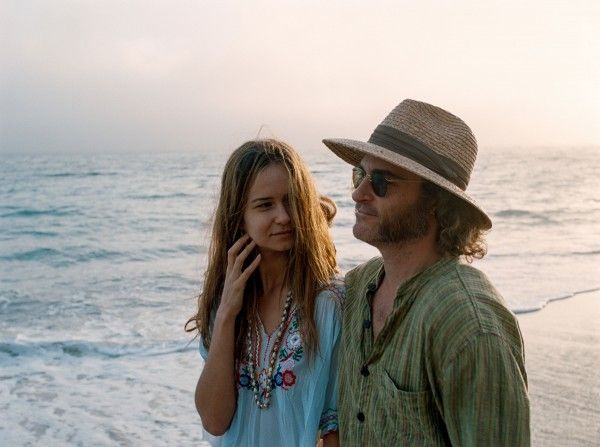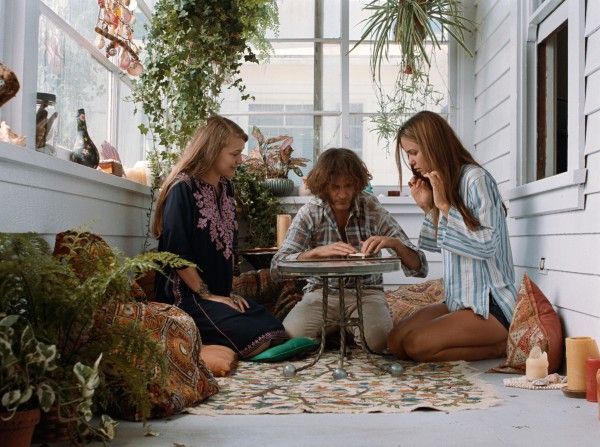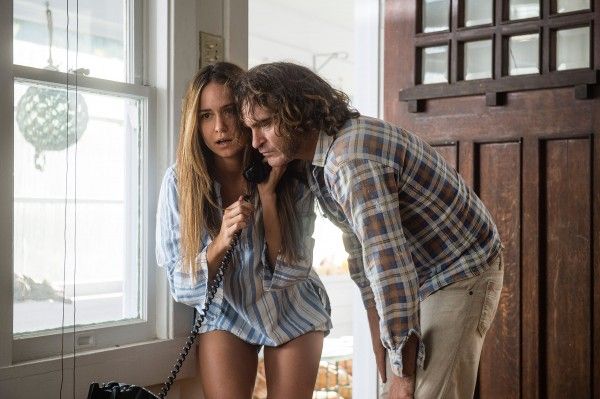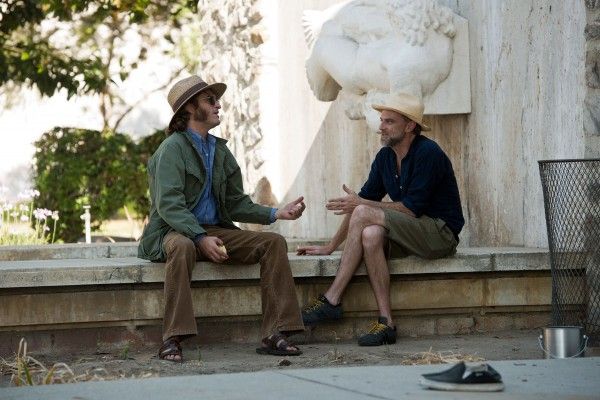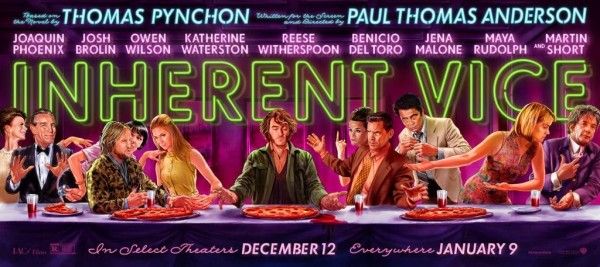If Joaquin Phoenix's character Doc Sportello bears witness to the end of the 60's in Paul Thomas Anderson's new film Inherent Vice, then Katherine Waterston's Shasta Fay Hepworth is what he bears witness to. Aside from being the engine that sets the story in motion, she utterly embodies the change that occurred in the culture as free love gave way to greed and paranoia (Shasta herself being a victim of these things, not an avatar for them). Along with a handful of other journalists, I recently had a chance to sit down with Waterston to discuss her role, and what it's like working with such a singular director.
Hit the jump for our interview with Katherine Waterston. Inherent Vice is now playing in limited release before going wide on January 9th. It also stars Josh Brolin, Owen Wilson, Reese Witherspoon, Benicio Del Toro, Eric Roberts, Martin Short, Sasha Pieterse, Joanna Newsom, and more.
Question: How has this experience been for you so far, just being involved with this film and starting to get reactions back?
KATHERINE WATERSTON: Awesome, in a way. It’s just a little bit strange because I’ve mostly done theater in the last ten years and then small parts in film. I haven’t been asked to promote them, so basically like, nobody’s asked me a question in ten years. I’ve never had to talk about my work, nobody’s given a damn about it - you know, what I thought. I find that I sort of like that, to get to keep it to myself. It’s a bit bizarre.
It sort of feels like people say, “Explain yourself to me, young lady.” And I feel like the stammering kid who’s like, “I don’t know, I’m sorry. I picked up that vase, I didn’t know it was going to slip out of my hand and kill that guy.” It’s a little bit bizarre but it’s also fascinating and it’s interesting to meet people who do other things. It’s been cool talking to people about it but new and weird, for sure.
Your character sort of sets everything in motion. You’re in the very first scene, you’re the inciting incident and your character also represents the slide of the utopian qualities of the 60’s into the more corrupted part of the 70’s. Is that something that you keep in mind when you’re giving your performance?
WATERSTON: I like everything you just said, I’m not sure I thought all of it all out when I was working. But I like it. I did see that and when I read the book, she was a bit of a victim of the changing times in a way. I really connected to the sorrow in her. But you can’t really think about how important a scene is to the film. I can’t anyway, because I don’t want to be a basket case on set. I try to sort of quiet all of that, all those thoughts, kinda just let yourself be aware of them when you’re preparing to do the work but then once you get there you have to feel as free as possible. Anything that I perceived as something that ran the risk of stressing me out, I just left outside the studio doors because I didn’t want to undermine myself.
Did you look particularly closely at the Pynchon source material to kind of get your head around her?
WATERSTON: Oh yeah. I mean maybe to get my head around her but also just for fun. I read the novel very quickly, the first time I read it in two days, which is not the best way to read Pynchon. And I knew I was going to miss so much doing it that way but I just wanted to read it before I sat down with Paul and Joaquin.
Then after that, I re-read it a few more times and then I just lived in it really, all summer. You have a ten minute break to go back to your trailer. I’d just pick it up, see what I could see. Because every time you open that book, I found the more I read it, the more I found. I still open it up every now and then just to test it out, to see if there’s more I can find, and I always do. It’s really so incredibly rich, I mean, his language is so incredibly rich.
It was a treat to have that to rely on or to use if I felt like I needed something to bring me back into the world of it. You can read a sentence some days and just remind you of the energy and the feeling of it, which was useful to me, but mostly just fun. I think I was picking it up because it was fun to pick up.
As an actress, what is it like to be on a Paul Thomas Anderson set? What’s the mood, what’s the tone, what was your experience working with him?
WATERSTON: He’s just so great. His crew, a lot of them have worked with him from the beginning or at least done many films with him and they’re so thrilled and proud to be there. The energy is just contagious and incredibly positive, incredibly warm. I’ve never been on a set where everybody smiles and says, “Good morning,” to you as much as there. There’s just a real genuine feeling of love and respect on the set. I don’t know if that goes from the bottom up or the top down, it seems to just be going in every which way. He just genuinely loves actors and that turns out as actually kind of rare. It shows up in all of his films, the long takes he does.
Are you getting a lot of takes, a lot of different chances to try different things? Or is it kind of shoot it, got it, moving on?
WATERSTON: Yeah. There’s just total freedom, a feeling of total freedom. That doesn’t mean you end up doing loads of takes but you know you’re not gonna stop until it feels right. I mean, that’s the best feeling.
How much work goes into the scene before the camera ever starts rolling? Do you get a chance to work shop with the other actors?
WATERSTON: Yeah. It’s just so casual and organic, the way we’d approach the scenes. Low pressure, very quietly. Sometimes Paul and Joaquin would sit around for a little bit. Even the space in his house, where I did most of my work, sometimes they’d just sit silently together. Which is so strange but even that just kind of get connected to the space and get used to each other.
Maybe sometimes after a while someone would say, “Maybe I should stand up on this one. Yeah, yeah, maybe.” And I’d go by it again, “Was this the way it was written in the novel? Should we try. Is it a little different?” I’d go pick up the book, “Yeah, yeah, there’s...” And Paul would say, “Why did I take that out? I shouldn’t have changed that. Pynchon’s perfect.” Then you go back and, “Cut it again.” It’s tinkering and it’s ease that’s really, really lovely.
Getting into the character, did you allow yourself to fully understand where she was coming from and let the enigma surround her? Or was that enigma inherent in your approach?
WATERSTON: I feel like I can answer that and be sort of talking out of both sides of my mouth because it was very important to me to have a very clear understanding of who she was and what she wanted. It was also very important for me to keep as much of that to myself as I could. So if I had a big problem or question, I didn’t tell Paul what I was thinking. I certainly didn’t tell Joaquin because I didn’t want to spoil the experience.
I also think the film is about confusion and so, sometimes I found when I wasn’t sure say, how scared she should be. Is she scared because she knows that she’s scared? Or is she scared because she thinks maybe she should be scared but maybe she shouldn’t be scared because maybe it’s not actually as scary as she thinks it might be? There’s a lot of that sort of - I sometimes let myself live in the confusion. That was once I had a really strong grasp on who she was.
The way the story plays was sort of film noir convention. Did you see her as sort of a version of a femme fatale, kind of like a tweaked 70’s version of that?
WATERSTON: Almost as soon as that occurred to me, which it occurred to me pretty quickly on in the first few pages of the novel, I stopped thinking about it and didn’t think about it again until I watched the movie.
Just so you wouldn’t be playing an archetype?
WATERSTON: Yeah. I didn’t want some kind of idea like that getting in my way or overwhelming me. To the extend that it’s there, it’s on the page and I didn’t have to act it. I wanted to let the structure of the story do its job and then I do mine. I wanted her to be real and I didn’t want her just to be a manipulative archetype.
Joaquin and Paul worked together several times now. You have a front row seat to their collaboration. What most impressed you or did you take away from seeing these two work together?
WATERSTON: God, this is so weird. Sometimes I just feel like the answer I have is like in The Master when he’s doing the Rorschach. I find out what I think because it’s the first thing that comes to mind. What I love about the way they both work is that all of the monkey business is on film. There’s no monkey business outside of the monkey business of making the movie. There’s no ego bullshit, there’s no wasted energy. It’s all directed at the story and that’s rare. It shouldn’t be rare, it’s rare. I guess also, you don’t have to be a jerk to be a good artist. That’s true for both of them.
As a viewer, I thought the movie was warm and funny but also pretty melancholy. As someone who participates in the project for a much longer period of time. What’s the primary emotion that you associate with it?
WATERSTON: That I associate with it as a viewer?
The story and the vibe of the film, not necessarily what you experienced on set but the emotion that you associate with the material.
WATERSTON: Sorry. I’m too close to it to reduce it in that way. I don’t think I can pick one. But when you said that, there’s hilarity and sorrow in it. It just blows my mind at how talented Paul is bringing all that into one story and letting it live together and work together. He’s a pretty talented guy.


